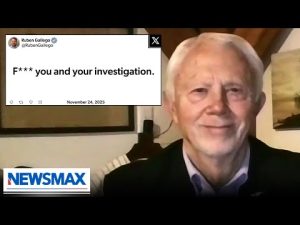### The Unraveling of the Epstein Money Trail: A Tale of Suspicious Transactions
In the shadowy world of finance and crime, few stories have captivated the public imagination like that of Jeffrey Epstein. While many chime in about the horror of his actions, it’s essential to focus on the financial elements of this intricate puzzle. The real question at hand isn’t just about Epstein’s heinous crimes; it’s about how the financial systems allowed him to thrive while engaging in suspicious activities worth billions of dollars. And folks, this is a story that deserves attention.
From 2002 to 2016, JP Morgan Chase reported a mere seven suspicious activity reports (SARs) amounting to $4.3 million connected to Epstein. This number appears insignificant in the grand scheme of things. However, after Epstein’s death in 2019, that number exploded with the filing of two additional reports encompassing a staggering 5,000 suspicious wire transfers totaling a whopping $1.3 billion. It’s hard to ignore the timing and scale of these financial alerts, prompting serious questions about compliance and oversight within one of the world’s largest banks.
Let’s dive into the mechanics of how these suspicious activity reports work. Banks are required by federal law to report anything that raises red flags, and we’re talking about serious flags—human trafficking, money laundering, and dealings with foreign entities are just a few examples that typically set off alarms. So, how did JP Morgan Chase manage to overlook 5,000 individual transactions that screamed out for scrutiny? The answer isn’t so simple, and it certainly stretches beyond a few rogue employees.
Despite the bank’s obligation to file reports and investigate suspicious behavior, internal emails suggested the bank may have intentionally delayed reporting Epstein’s suspicious activities. Why would a financial institution choose to ignore illegal transactions linked to a convicted sex offender, especially when those transactions involved connections to shell companies and foreign banks? The implications are troubling. This isn’t merely a matter of negligence; it hints at a willful blind eye toward illicit activity.
Senator Ron Wyden, not exactly known as a conservative firebrand, has publicly called for a criminal investigation into JP Morgan Chase’s actions. One might wonder why such a powerful institution seemingly operated outside the law without consequence. Is this a case of Epstein being too valuable an asset to the bank, due to his connections with the rich and famous? If this is the standard to which the powerful are held, it leaves one pondering about the other layers of corruption intertwined with Epstein’s dealings—and the monumental question of what else financial institutions might be turning a blind eye to.
In the end, this entire saga raises critical questions about the integrity of our financial systems. If JP Morgan Chase could ignore billions linked to a known criminal, what else might they be overlooking? What does it say about the infrastructure designed to keep our financial world in check? This story is about much more than just Epstein. It suggests a far-reaching network of influential players and financial practices that deserve scrutiny. It’s time to follow the money, as the implications stretch far beyond the man at the center of it all.







